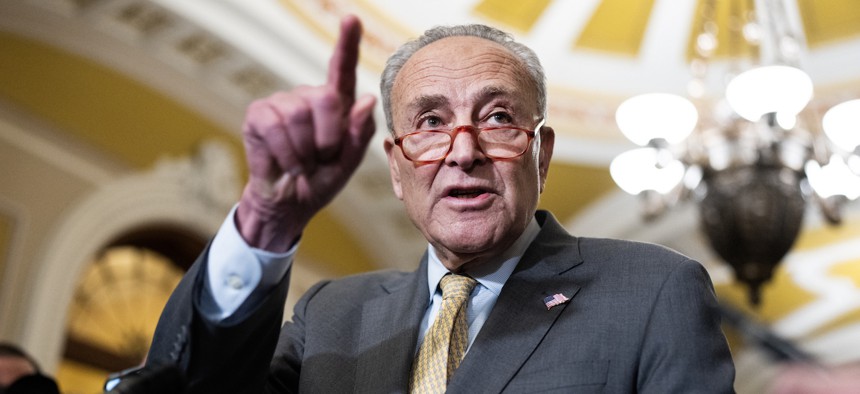Policy
Senate to advance short-term funding measure as shutdown deadline nears
But the House is continuing to pursue deep cuts to spending that stand no chance across Capitol Hill or in the White House.

Sen. Majority Leader Charles Schumer, D-N.Y., conducts a news conference in the U.S. Capitol on Sept. 19, 2023. On Tuesday evening, the Senate will vote on a motion to begin consideration of a bill reauthorizing the Federal Aviation Administration, which Schumer will use as a vehicle to also consider a four- to six-week continuing resolution to keep the government funded at current levels. Tom Williams/CQ-Roll Call, Inc via Getty Images
The Senate is slated to begin consideration of a short-term measure aimed at averting a government shutdown, though there is still no sign that their colleagues in the House will follow suit ahead of the Saturday deadline to fund federal agencies.
Absent Congressional action by the end of this week, federal agencies will begin to shutter on Oct. 1. Agencies would then furlough a significant portion of the more than 2 million federal workers, while the remainder will be forced to work without pay for the duration of the lapse in appropriations. Both furloughed and excepted employees will automatically get backpay once the government reopens.
On Tuesday evening, the Senate will vote on a motion to begin consideration of a bill reauthorizing the Federal Aviation Administration, which Senate Majority Leader Chuck Schumer will use as a vehicle to also consider a four- to six-week continuing resolution to keep the government funded at current levels.
According to Politico, the continuing resolution will include only minimal supplemental appropriations on issues like disaster relief and Ukraine aid, in an effort to prevent Senate conservatives from objecting to a unanimous consent request to take up and swiftly pass the bill.
But on the other side of the U.S. Capitol, House lawmakers have shown little sign that they are willing to abandon calls for significant cuts to discretionary spending beyond what the House previously agreed to as part of the deal to raise the debt ceiling last spring. House leadership will begin consideration of four appropriations bills, albeit with cuts to domestic spending that would make the legislation a nonstarter with both the Senate and the White House.
Unions and other organizations representing federal employes are urging House lawmakers to end their stalemate and reach a deal to keep the government open, warning of the harm both to federal workers and members of the public.
“Simply put, the political theatrics have got to stop,” said Everett Kelley, national president of the American Federation of Government Employees, in a letter to lawmakers last week. “The refusal of Congress to do its job and put to rest fears of a shutdown or massive and unwarranted cuts is impeding federal employees from doing their jobs, delaying assistance and service to the American people and threatening the health of our economy.”
National Treasury Employees Union National President Doreen Greenwald highlighted the fact that a lapse in appropriations would affect service and employees across the country, not just in the Washington, D.C., area.
“A government shutdown is not a harmless, D.C. drama. Federal employees in every American community will lose income, through no fault of their own, and in many cases, they will be locked out of doing the work they were hired to do for the American people,” she said. “Career civil servants, many of them already living paycheck to paycheck, do not deserve to have their financial security shattered by political dysfunction.”
The Professional Managers Association noted that even keeping funding flat, such as via a continuing resolution, is effectively a cut for many agencies, due to inflation and rising fixed costs such as employee salaries. President Biden currently plans to provide federal employees with a 5.2% average pay raise in 2024.
“We urge Congress to recognize that after providing a pay raise to employees—which Congress has not separately included in appropriations in recent years—and accounting for inflation, even keeping IRS funding stable results in an effective cut,” the group said in a statement.
And Randy Erwin, president of the National Federation of Federal Employees, focused on the impact a shutdown has not only on the federal workforce, but the communities that those workers serve.
“A government shutdown is a tremendous burden on the American people,” he said. “Federal government workers perform numerous functions critical to our way of life. Federal employees keep our military ready, care for our cherished veterans, and maintain our national parks, forests and other public lands . . . They perform thousands of crucial functions like these every day. A government shutdown would lock many federal workers out of their jobs and keep these critical tasks from being performed.”
This story was first published on Government Executive.
NEXT STORY: North Florida sheriff says his county is being ‘inundated’ by bears
